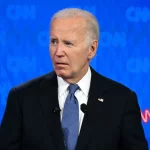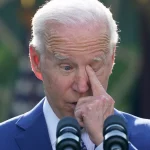By Jeff Stein, John Hudson and Rachel Lerman. Updated October 5, 2022 at 11:30 a.m. EDT|Published October 5, 2022 at 9:03 a.m. EDT. Media: The Washington Post.
![]() A man walks past OPEC headquarters on Monday on the eve of the 45th Meeting of the Joint Ministerial Monitoring Committee and the 33rd OPEC and non-OPEC Ministerial Meeting held in Vienna. (Joe Klamar/AFP/Getty Images)
A man walks past OPEC headquarters on Monday on the eve of the 45th Meeting of the Joint Ministerial Monitoring Committee and the 33rd OPEC and non-OPEC Ministerial Meeting held in Vienna. (Joe Klamar/AFP/Getty Images)
“The President is disappointed by the shortsighted decision by OPEC Plus to cut production quotas while the global economy is dealing with the continued negative impact of Putin’s invasion of Ukraine,” National Security Adviser Jake Sullivan and National Economic Council Director Brian Deese said in a statement.
The OPEC Plus coalition, which is led by crude-oil giant Saudi Arabia, said the cut in production would take effect in November. This would be the first time the group cut oil production targets since the beginning of the pandemic.
Wednesday’s move was more aggressive than most analysts had expected even a few days ago, and reflects the oil producing nations’ desire to react to the recent drop in global prices.
Higher energy prices could help Russia finance its war on Ukraine, a move the United States has sought to avoid. Higher energy prices could also weaken the resolve of other countries, which have supported Ukraine in trying to repel Russia after the February invasion.
Energy stocks climbed slightly on the news, contrasting to declines in the overall financial markets.
“The intention of the OPEC Plus cut was to break the fall in crude prices since the summer,” said Bob McNally, an energy analyst at the Rapidan Energy Group. “If they succeed, then gasoline pump prices should also stop falling and range around current levels, until other market drivers impact the price.”
The cut comes despite aggressive lobbying by the Biden administration for the consortium to continue production at current levels or higher — punctuated by Biden’s visit to Saudi Arabia in July. Biden had earlier in his administration vowed to make Saudi Arabia an international pariah, but he re-engaged while trying to use all available channels to curb increases in the price of gas that had hurt his domestic approval ratings.
Biden’s efforts have been overshadowed by a recent steep drop in the price of oil that moved the consortium to act at an in-person meeting for the first time since 2020 in Vienna, on Wednesday. The price drop in oil prices was driven by a souring of the global economy, forcing demand to plunge. The production cut aims to lift prices back up.
The significant cut could also have considerable political fallout in the United States, where midterm elections will be held in just over a month. Falling gas prices this summer played a big role in lifting the political fortunes of Democrats, who face a tough election season. They also helped elevate Biden’s approval rating, and gave the party a glimmer of hope for blunting a widely anticipated Red Wave in November.
The OPEC coalition’s move could also add to inflationary pressures in the United States and Europe, as well as undercut the effort to bolster Ukraine as it defends itself against the Russian invasion. Russia relies on gas and oil sales for a large portion of its budget and had pushed for the production cut, which will enable Moscow to sell oil for higher prices on the global market, generating more revenue for its war and troop mobilization.


 A man walks past OPEC headquarters on Monday on the eve of the 45th Meeting of the Joint Ministerial Monitoring Committee and the 33rd OPEC and non-OPEC Ministerial Meeting held in Vienna. (Joe Klamar/AFP/Getty Images)
A man walks past OPEC headquarters on Monday on the eve of the 45th Meeting of the Joint Ministerial Monitoring Committee and the 33rd OPEC and non-OPEC Ministerial Meeting held in Vienna. (Joe Klamar/AFP/Getty Images)

























































































